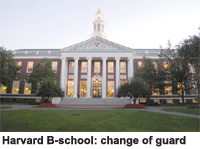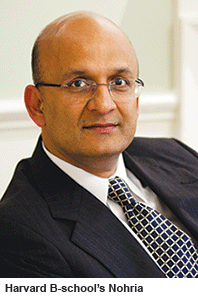They are changing the guard at some of the world’s leading business schools. On May 4 Harvard Business School (HBS) announced the appointment of a new dean, India-born Nitin Nohria. The Kellogg School at Northwestern University has also recently selected a new head, and the Judge School at the University of Cambridge, the Ross School at the University of Michigan and the Booth School at the University of Chicago are all in the process of doing the same.
The newcomers will have some of the most enviable jobs in academia. The business education market has been booming for decades: the number of MBAs awarded by American business schools has swelled from 21,561 in 1969-70 to 150,211 in 2006-07. And B-schools are rolling in money. HBS’ endowment is about $2.1 billion (Rs.9,500 crore). Chicago’s business school changed its name to Booth when an alumnus handed it $300 million (Rs.1,357 crore).
 Yet even elite schools are plagued by self-doubt. The financial crisis has dealt them a double blow. It has damaged their reputations, because so many bankers are MBAs. It has also dented their market: Wall Street laid off 240,000 people in the 18 months from the middle of 2007. But the schools’ problems run deeper than this.
Yet even elite schools are plagued by self-doubt. The financial crisis has dealt them a double blow. It has damaged their reputations, because so many bankers are MBAs. It has also dented their market: Wall Street laid off 240,000 people in the 18 months from the middle of 2007. But the schools’ problems run deeper than this.
The B-school boom depended largely on the idea that MBAs were entry tickets to the world’s two most lucrative professions: investment banking and consultancy. But banks and consulting firms are increasingly recruiting people without MBAs, particularly mathematicians and computer scientists. They are also getting keener on growing their own. Why lose a hard-working 25-year-old for a couple of years when you can train him internally and keep him on the job?
 Moreover criticism of MBAs extends beyond consultancies and banks. People in many industries worry that B-school professors are more concerned with pure theory than with practical management (promotion is usually earned by publishing articles in academic journals rather than by teaching, advising businesses or acquiring managerial experience). The professors themselves complain that their students are spending ever more time looking for jobs and ever less time studying.
Moreover criticism of MBAs extends beyond consultancies and banks. People in many industries worry that B-school professors are more concerned with pure theory than with practical management (promotion is usually earned by publishing articles in academic journals rather than by teaching, advising businesses or acquiring managerial experience). The professors themselves complain that their students are spending ever more time looking for jobs and ever less time studying.
These problems are already taking their toll on the two-year courses that once constituted the ideal of business education. Students are gravitating to one-year MBAs, which are offered by 70 percent of European business schools, and more specialised courses. Lower-ranked business schools are already finding it harder to fill their places. The elite worry that the trend will eventually catch up with them too.
Yet business schools have an important asset: they are remarkably flexible compared with the rest of academia. Even before the financial crisis they had begun to implement far-reaching changes. Both Stanford Business School and the Yale School of Management have changed their curricula radically in the past few years. Others will surely follow.
Business schools are also wise to globalisation. INSEAD led the pack by opening a second campus in Singapore: all its students have a chance to study in Asia as well as Europe. Almost everybody has leapt on the bandwagon. The Booth School has outlets in three continents. Most schools have research centres across the world. Foreign students make up 34 percent of students in America’s elite schools and 85 percent in European schools.
Business schools have also struggled to make their courses less theoretical. Yale has replaced conventional subject-based courses (marketing and so forth) with “integrated” courses based on “constituencies” (such as investors, customers and employees). The University of Michigan’s Ross Business School gives students a chance to work with, say, hospitals in India and energy companies in Mozambique.
(Excerpted and adapted from The Economist)























